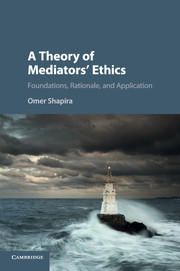Book contents
- Frontmatter
- Dedication
- Contents
- List of figures
- List of tables
- Preface
- Abbreviations of codes of conduct
- PART I A theory of professional ethics
- PART II A theory of mediators’ ethics
- 3 Mediation, mediators’ role, and mediators’ ethics
- 4 Party self-determination
- 5 Mediator competence
- 6 Conflicts of interest
- 7 Mediator impartiality
- 8 Professional integrity
- 9 Diligence, respect and dignity, and honesty
- 10 Confidentiality
- 11 Fairness
- 12 Maintaining the profession's standing and advancement of the profession
- 13 Advertising, solicitation, and mediator fees
- 14 Obligations to employers and principals
- PART III Dealing with ethical problems
- Appendix I A proposed model code of conduct for mediators
- Appendix II Model standards of conduct for mediators (2005)
- Bibliography
- Index
8 - Professional integrity
from PART II - A theory of mediators’ ethics
Published online by Cambridge University Press: 05 March 2016
- Frontmatter
- Dedication
- Contents
- List of figures
- List of tables
- Preface
- Abbreviations of codes of conduct
- PART I A theory of professional ethics
- PART II A theory of mediators’ ethics
- 3 Mediation, mediators’ role, and mediators’ ethics
- 4 Party self-determination
- 5 Mediator competence
- 6 Conflicts of interest
- 7 Mediator impartiality
- 8 Professional integrity
- 9 Diligence, respect and dignity, and honesty
- 10 Confidentiality
- 11 Fairness
- 12 Maintaining the profession's standing and advancement of the profession
- 13 Advertising, solicitation, and mediator fees
- 14 Obligations to employers and principals
- PART III Dealing with ethical problems
- Appendix I A proposed model code of conduct for mediators
- Appendix II Model standards of conduct for mediators (2005)
- Bibliography
- Index
Summary
Introduction
From a professional ethics perspective, professional integrity is a fundamental ethical norm that describes the state of being committed to the nature and definition of the professional role and to the wholeness of the professional service provided. Mediation literature and codes of conduct for mediators, however, have not dedicated much space to it. They tend to focus on the integrity of the process of mediation and on mediators’ duty to maintain process integrity, rather than on the more general norm of professional integrity of mediators and their duty to maintain professional integrity in their conduct of mediations, a norm that encompasses a duty to maintain process integrity but is not limited to it.
Jacqueline M. Nolan-Haley, for example, has noted that “the mediator is said to represent the integrity of the mediation process” and argued that “[t]he mediator … owes an obligation to both parties to maintain the integrity of the mediation process”; the Georgia Standards provide in a Fairness standard that “[a] mediator is the guardian of the integrity of the mediation process” and that he or she “must protect the integrity of the process.” The Model Standards use the term integrity in the context of two standards: the Conflicts of Interest standard provides that “a mediator shall withdraw from or decline to proceed with the mediation” if “a mediator's conflict of interest might reasonably be viewed as undermining the integrity of the mediation”; and the Advertising and Solicitation standard provides that “[a] mediator shall not solicit in a manner that gives an appearance of partiality for or against a party or otherwise undermines the integrity of the process.” The California Rules provide that mediators in court-connected programs are responsible for conducting themselves in a manner that merits “broad public confidence in the integrity and fairness of the process,” and hold in the context of an Impartiality and Conflicts of Interest rule that a mediator must withdraw from the mediation if “[p]roceeding with the mediation would jeopardize the integrity … of the mediation process”; lastly, the Virginia Standards provide in a Quality of the Process standard that “[t]he mediator shall terminate the mediation when, in the mediator's judgment, the integrity of the process has been compromised.”
- Type
- Chapter
- Information
- A Theory of Mediators' EthicsFoundations, Rationale, and Application, pp. 231 - 254Publisher: Cambridge University PressPrint publication year: 2016



